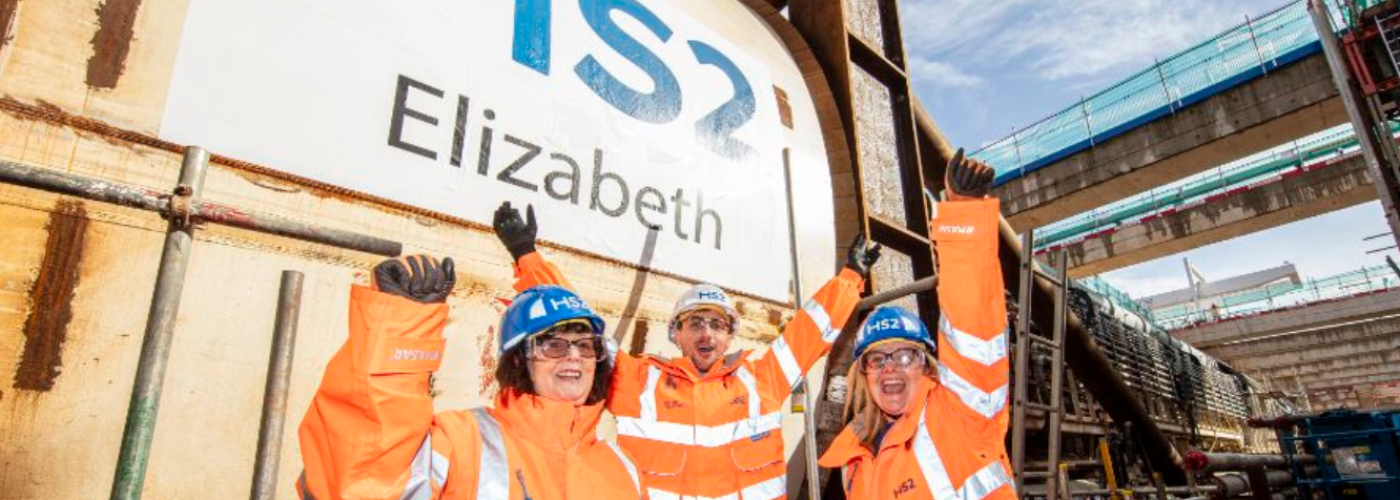- The 1,600 tonne tunnel boring machine has started digging the second bore of HS2’s Bromford Tunnel into Birmingham
- 10 apprentices have secured exciting jobs working on the 24/7 tunnelling operation
- Local school pupils have named the TBM ‘Elizabeth’ after Dame Elizabeth Cadbury
Balfour Beatty VINCI has launched its last tunnel boring machine (TBM) to dig tunnels for HS2, the new high speed railway in the West Midlands.
The 125 metres long TBM has started on its journey to dig the second bore of HS2’s Bromford Tunnel, between the east portal at Water Orton in North Warwickshire and the west portal at Washwood Heath in Birmingham.
The 3.5 mile twin bore tunnel will take high speed trains in and out of Birmingham, with a series of viaducts between Washwood Heath and Curzon Street Station taking trains to the city centre.
The first TBM, which launched in June 2023 and was named ‘Mary Ann’ – the real name of Warwickshire-born author George Eliot, has completed around one third of her journey digging towards Birmingham. So far, the machine has tunnelled under the Park Hall Nature Reserve, is currently near the River Tame, and will continue adjacent to the M6 at a depth of 27 metres before breaking through at Washwood Heath later this year. The second TBM is due to finish its journey in Autumn 2025.
The full Bromford Tunnel programme is being delivered by around 450 people working for Balfour Beatty VINCI. A specialist tunnelling team working for Balfour Beatty VINCI’s sub-contractors Tunnelcraft and Solihull-based Rorcon, are operating both TBMs 24/7, with each bore taking around 16 months.
Following the tradition of naming HS2 TBMs after famous women from the local area, pupils from Paget Primary School in Birmingham chose to call the machine ‘Elizabeth’ after Dame Elizabeth Cadbury, who spent her life campaigning for the education and welfare of women in Birmingham.
The name was unveiled on site by Lucy Holmes – Forest School Lead at Paget Primary School, and Diane Donaldson – Birmingham City Councillor for Bromford & Hodge Hill Ward.
Jules Arlaud, Tunnelling Director for Balfour Beatty VINCI said: “Today marks Balfour Beatty VINCI’s fourth and final TBM launch – an incredible moment for our tunnelling team who have worked tirelessly to achieve this milestone.
“As ‘Mary Ann’ continues her journey towards Washwood Heath in Birmingham, we’re now looking forward to having two machines underground, as this fascinating and complex stretch of the HS2 route inches another step closer to completion.”
Catherine Loveridge, HS2’s Senior Project Manager said: “It’s fantastic to see this last West Midlands TBM get underway, marking another key moment for HS2 in the region. We’re now at peak construction on the project, delivering these massive feats of engineering using many local companies and local skills.
“Over a third of our total HS2 workforce are based at worksites across the West Midlands, and thousands more jobs are still to be created locally as work to build Curzon Street Station, Interchange Station and the Washwood Heath Depot gathers momentum.”
Tunnelcraft have recruited nine tunnelling apprentices, including formerly unemployed people from the local area, providing a unique opportunity to learn new skills and start a new career.
Cormac Hicks, Managing Director at Tunnelcraft Ltd said: “This massive feat of engineering is providing a unique opportunity for people from the local area to come and work with us, learning new skills and qualifications in the process.
“At Tunnelcraft, we have a range of entry role positions still available and would encourage local people to get in contact. There has never been a more promising time to start a career in UK tunnelling.”
Elliot Stanley, Tunnelcraft Tunnelling Apprentice said: “Looking back on what we have learnt in such a short space of time is incredible. HS2 is a massive project and when it’s finished I can say that I played a big part in making that.”
Solihull-based company Rorcon were awarded a subcontract by Balfour Beatty VINCI in 2023 to provide specialist tunnel labour for the Bromford tunnels. Around 60 people including one apprentice from the company are working on the Bromford Tunnel programme.
Terry Grogan, Managing Director of Rorcon Limited said: “As a family-owned SME based in Solihull, we’re delighted to be involved in a project so close to home. It’s a privilege to be part of the Balfour Beatty VINCI and HS2 supply chain on a project that will have such a positive impact on the local community for the coming generations, whether that be providing jobs to the local area or by those who utilise the rail network once complete – a real bonus for the West Midlands.”
As part of Balfour Beatty VINCI’s school engagement programme, pupils at Paget School in Birmingham have named the second TBM ‘Elizabeth’ after learning about famous women from Birmingham. They chose the name after Dame Elizabeth Cadbury DBE, who founded the Birmingham Union of Girls’ Clubs, was Vice President of the Electrical Association for Women, and President of the United Hospital in Birmingham.
Together with her husband – George Cadbury, the chocolate manufacturer – she participated in the reform of industrial working and living conditions through supporting the welfare, health and education of women and children in Bournville. For her public service Elizabeth Cadbury was made an OBE in 1918 and a DBE in 1934.
Lucy Holmes, Forest School Lead at Paget Primary School said: “Our pupils have been learning about the importance of the Cadbury family in Birmingham, and we’re thrilled that we could name the TBM after Dame Elizabeth Cadbury. We’d like to thank HS2 and Balfour Beatty VINCI for their continuing involvement with our school.”
Both TBMs will remove a total of 1.87 million tonnes of excavated material, which is sifted at the on-site slurry treatment plant and reused on HS2’s nearby sites at Delta Junction, where a complex network of 13 viaducts is being built. HS2 has built dedicated roads between these construction sites, including an access off the M6/M42 link roads, in order to take lorries off public roads. Working as an ‘underground factory’, both TBMs will put a total of 41,594 concrete segments in place, creating 5,942 rings to make the twin bore tunnel, with each ring weighing 49 tonnes. The segments are being produced at Balfour Beatty VINCI’s pre-cast factory at Avonmouth near Bristol.
Building, Design & Construction Magazine | The Choice of Industry Professionals





